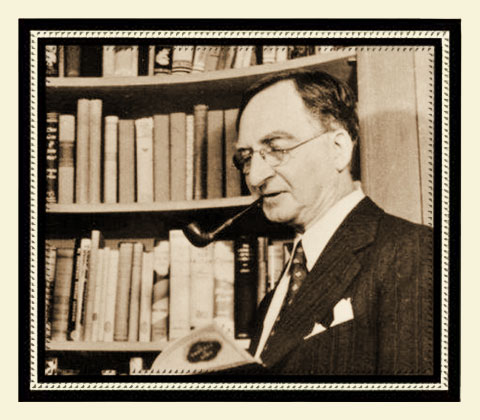New York, 1876 — London, 1964
Musician, engraver, printer, pacifist and militant defender of civil rights, journalist and important North American publisher
He was the son of the Hungarian orthodox Jew Adolph Huebsch (1830-1884), who presided over the New Synagogue of Prague and later transferred to the Congregation Ahavath Chessed in New York. There, the rabbi adopted reforms in the Jewish liturgy and organized a new book of moderately liberal prayers. An orientalist professor emeritus, in the USA he published an anthology of Arab aphorisms, among other titles.
An anti-militarist, before the USA joined the First World War, Benjamin Huebsch was active in the pacifist crusade as a militant of the Ford Peace Plan Commission (1915-1916). Later he created and directed the liberal weekly The Freeman (1920-1924) and was one of the founders of the American Civic Liberties Union, a pioneering entity. Founder of the publisher B.W. Huebsch, specializing in contemporary German literature, which in 1925 became part of Viking Press, where he acted as vice president and editorial director. Among the writers he introduced to the USA were James Joyce, Thomas Mann and pacifist Erich Maria Remarque, and he launched the short story writer Sherwood Anderson, who had such an influence on the generation of Faulkner and Hemingway.
The intense relationship with Stefan Zweig began in 1925 and endured until the eve of his suicide. The correspondence is made up of almost 500 letters in both directions and is not limited to editorial matters. More than partners, they were great friends. The fact that they used their mother tongue greatly helped the epistolary exchange. Five years his senior and less vulnerable, he was Zweig’s true confidant, above all in the last years (1941-1942), when the author’s letters started to resemble true therapy sessions.
Zweig may be considered a “publisher’s writer”: the key to his commercial success may well lie in the perfect working relationship with the firms with which he associated and which he never considered mere printers or booksellers, but working establishments. A paradigm for this style was his long partnership with Anton Kippenberg, the proprietor of Insel Verlag, where he published his greatest successes, a partnership which was only broken in 1933 when the publisher betrayed him manoeuvring in favour of the Nazis. However none of his devoted publishers risked translating any of his works. Ben Huebsch had the intellectual stature for this: he translated from German into English his final fictional creation, the novella The Royal Game, and collaborated on the translation of his memoirs, The World of Yesterday, the birth of which he followed closely.
After the war he was chosen by UNESCO to represent the USA.
Address listed: s. Viking Press, 285 Central Park West, New York. Tel. Schuyler 4-3038
